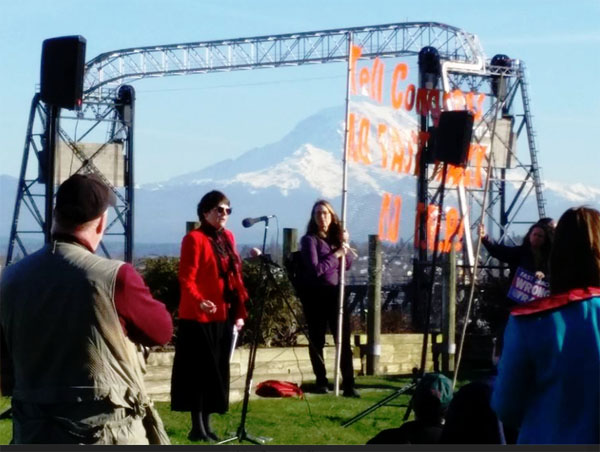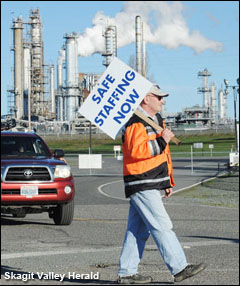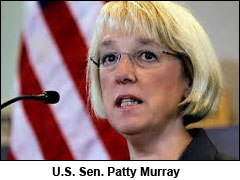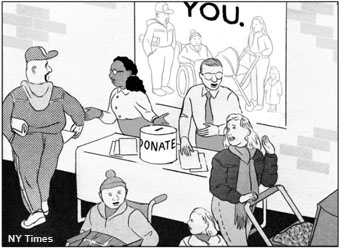NEWS ROUNDUP
Anacortes pickets, what we paid for, an immigration secret…
Wednesday, February 18, 2015
TRADE
 ► In today’s News Tribune — Different sides air views of Trans-Pacific Partnership trade pact in Tacoma — U.S. Secretary of Commerce Penny Pritzker brought the gospel of trade to Tacoma on Tuesday morning, meeting with business leaders and elected officials in part to promote the Trans-Pacific Partnership, an international trade agreement. And at Tacoma’s Fireman’s Park on Tuesday afternoon, some five dozen union leaders and members, environmentalists and other residents heard speakers urge Congress to consider any proposed trade deal cautiously with an eye toward protecting American workers’ wages and benefits and ensuring the safety of goods imported into the United States. “We’re not opposed to a trade agreement,” Lynne Dodson, secretary-treasurer of the Washington State Labor Council, told the assembled workers. “We just want to see wages rise, not fall, and see the safety of our food protected.”
► In today’s News Tribune — Different sides air views of Trans-Pacific Partnership trade pact in Tacoma — U.S. Secretary of Commerce Penny Pritzker brought the gospel of trade to Tacoma on Tuesday morning, meeting with business leaders and elected officials in part to promote the Trans-Pacific Partnership, an international trade agreement. And at Tacoma’s Fireman’s Park on Tuesday afternoon, some five dozen union leaders and members, environmentalists and other residents heard speakers urge Congress to consider any proposed trade deal cautiously with an eye toward protecting American workers’ wages and benefits and ensuring the safety of goods imported into the United States. “We’re not opposed to a trade agreement,” Lynne Dodson, secretary-treasurer of the Washington State Labor Council, told the assembled workers. “We just want to see wages rise, not fall, and see the safety of our food protected.”
► In today’s Skagit Valley Herald — Group protests proposed Trans Pacific Partnership agreement — Members of the Washington Fair Trade Coalition rallied Tuesday outside the Mount Vernon office of U.S. Rep. Suzan DelBene (D-Wash.) in the hopes of urging her to oppose Fast Track legislation for the proposed Trans Pacific Partnership international trade pact.
PORT CONTRACT
► From AP — AP sources say port talks focus on arbitrator — The labor-management standoff that is disrupting billions of dollars of international trade at West Coast seaports now centers on the future of one man who resolves workplace disputes at the ports of Los Angeles and Long Beach. Three people with knowledge of the contract talks say negotiators for the dockworkers’ union want arbitrator David Miller out, while the association representing employers will not support changes that would allow his immediate removal.
 ► In the Sacramento Bee — The real roots of congestion at California ports (by international trade economist Jock O’Connell) — The rapid emergence of megaships has unhinged the ocean side of maritime supply chains from the land-side infrastructure. Compounding the impact of larger ships were other moves by the shipping lines. One involved how the containers were loaded onto ships at Asian ports. Before, containers were sorted by final destination and then stowed aboard ships. Now, loading has become more random, in effect shifting the responsibility for sorting containers to congested U.S. ports. So while there is no question that the dispute between the ILWU and the PMA has seriously aggravated the problem of container gridlock, it was not the cause. Nor will a labor accord yield a swift end to port congestion.
► In the Sacramento Bee — The real roots of congestion at California ports (by international trade economist Jock O’Connell) — The rapid emergence of megaships has unhinged the ocean side of maritime supply chains from the land-side infrastructure. Compounding the impact of larger ships were other moves by the shipping lines. One involved how the containers were loaded onto ships at Asian ports. Before, containers were sorted by final destination and then stowed aboard ships. Now, loading has become more random, in effect shifting the responsibility for sorting containers to congested U.S. ports. So while there is no question that the dispute between the ILWU and the PMA has seriously aggravated the problem of container gridlock, it was not the cause. Nor will a labor accord yield a swift end to port congestion.
EDITOR’S NOTE — Shutting down the ports hasn’t helped either.
► In today’s Bellingham Herald — Cargo ships anchor in Bellingham Bay during port labor dispute — Four large cargo ships remained in Bellingham Bay on Tuesday morning, Feb. 17, after West Coast ports were mostly shut down over the holiday weekend in a labor dispute.
REFINERY STRIKE
 ► In the Skagit Valley Herald — USW strike continues as talks resume — The Tesoro oil refinery in Anacortes is operating with a contingency staff after more than two weeks after a USW strike began. USW members from refineries around the region and members of other labor groups and union supporters joined the picket line outside the main gate of the Anacortes plant on March’s Point.
► In the Skagit Valley Herald — USW strike continues as talks resume — The Tesoro oil refinery in Anacortes is operating with a contingency staff after more than two weeks after a USW strike began. USW members from refineries around the region and members of other labor groups and union supporters joined the picket line outside the main gate of the Anacortes plant on March’s Point.
► From Bloomberg — Oil workers threaten to expand refinery strike to Long Beach port — USW members who help run crude terminals at a California port are threatening to join a national oil workers’ strike at U.S. refineries. Union members at the Port of Long Beach are negotiating their own contract with Tesoro Logistics LP, said Dave Campbell, secretary-treasurer of the local. The group will meet with ILWU members on Wednesday to discuss whether they would honor a walkout, he said.
STATE GOVERNMENT
 ► In the Columbian — What we paid for (editorial) — As giant corporations ceaselessly lobby for tax breaks, the question becomes what is best for the taxpayers. And that should be the overriding question. Incessant tax breaks for big companies have contributed to an economy that is increasingly difficult for the small businesses that form the backbone of a sturdy economy, allowing corporations to price small- and mid-sized businesses out of the market. Those tax breaks also benefit corporations that, in general, are seeing record profits while focusing upon their obligation to stockholders rather than the communities they inhabit. In the end, lawmakers should view such tax breaks with a more jaundiced eye, ensuring that companies live up to their promises of more jobs and working to assist small businesses rather than helping big-money behemoths.
► In the Columbian — What we paid for (editorial) — As giant corporations ceaselessly lobby for tax breaks, the question becomes what is best for the taxpayers. And that should be the overriding question. Incessant tax breaks for big companies have contributed to an economy that is increasingly difficult for the small businesses that form the backbone of a sturdy economy, allowing corporations to price small- and mid-sized businesses out of the market. Those tax breaks also benefit corporations that, in general, are seeing record profits while focusing upon their obligation to stockholders rather than the communities they inhabit. In the end, lawmakers should view such tax breaks with a more jaundiced eye, ensuring that companies live up to their promises of more jobs and working to assist small businesses rather than helping big-money behemoths.
► In today’s Seattle Times — Bill would nix Seattle’s minimum wage, but raise it statewide more than inflation — Sen. Mark Miloscia (D R-Federal Way) has introduced a bill that would scrap local authority to raise the minimum wage — meaning it would nix Seattle’s $15 per hour minimum wage approved last year. Instead, Miloscia’s proposal would index the wage to both urban inflation and personal income growth.
LOCAL
 ► In today’s Spokesman-Review — Paid sick leave policy leads to local thanks — Next time you get a burger at the Lantern Tap House in Spokane’s Perry District, rest assured it didn’t come with a cough. The restaurant has enacted a paid sick leave policy for its 10 kitchen employees, prompting immediate gratitude from its cooks and dishwashers, as well as an upcoming visit from U.S. Sen. Patty Murray (D-Wash). Murray will be at the pub Thursday afternoon to announce the Healthy Families Act, a bill she introduced to Congress with Rep. Rosa DeLauro, a Connecticut Democrat, that would allow American workers to earn up to seven days of paid sick leave a year – an elusive benefit for many low-wage workers.
► In today’s Spokesman-Review — Paid sick leave policy leads to local thanks — Next time you get a burger at the Lantern Tap House in Spokane’s Perry District, rest assured it didn’t come with a cough. The restaurant has enacted a paid sick leave policy for its 10 kitchen employees, prompting immediate gratitude from its cooks and dishwashers, as well as an upcoming visit from U.S. Sen. Patty Murray (D-Wash). Murray will be at the pub Thursday afternoon to announce the Healthy Families Act, a bill she introduced to Congress with Rep. Rosa DeLauro, a Connecticut Democrat, that would allow American workers to earn up to seven days of paid sick leave a year – an elusive benefit for many low-wage workers.
► In today’s Seattle Times — Mayor highlights bus service, preschool program, minimum wage boost — Mayor Ed Murray had plenty to crow about Tuesday as he delivered his annual State of the City address, calling Seattle “strong, vibrant and innovative.”
► In today’s Oregonian — Portland’s minimum wage: $15-an-hour advocates see victory, push for more — The Portland City Council could amend the city’s Fair Wage Policy on Wednesday to guarantee that 175 full-time city contractors and employees are paid at least $15 an hour.
► In today’s Tri-City Herald — Hanford Challenge, union plan public meeting on tank vapor exposure — UA Local 598 in Pasco and Hanford Challenge plan a public meeting Wednesday on Hanford worker exposure to chemical vapors from waste stored in the nuclear reservation’s underground tanks. The meeting will be 6 to 8 p.m. at the Local 598 Union Hall, 1328 Road 28.
IMMIGRATION
 ► MUST-READ from KUOW — Two best friends and an immigration secret in Seattle — How do you explain deportation to a child? A Seattle mom grappled with this question when her son’s best friend Jorge shared a secret one night at dinner. Her son Ronan was 6 at the time. His family is undocumented, Jorge told them. In that moment, his secret became one they would all keep together. Jorge’s family would be eligible for temporary legal status under the executive action President Barack Obama announced in November. But a federal judge this week temporarily halted the programs.
► MUST-READ from KUOW — Two best friends and an immigration secret in Seattle — How do you explain deportation to a child? A Seattle mom grappled with this question when her son’s best friend Jorge shared a secret one night at dinner. Her son Ronan was 6 at the time. His family is undocumented, Jorge told them. In that moment, his secret became one they would all keep together. Jorge’s family would be eligible for temporary legal status under the executive action President Barack Obama announced in November. But a federal judge this week temporarily halted the programs.
► From the Hill — Immigration fight takes a surprise turn — The Department of Homeland Security on Tuesday suspended President Obama’s expansion of deportation deferrals, scrambling a congressional debate over how to prevent a shutdown of the agency late next week. The DHS put the brakes on Obama’s executive actions after a Texas federal judge issued a temporary injunction blocking the new program, which could shield up to 5 million immigrants from deportation.
► In today’s NY Times — A judge’s assault on immigration (editorial) — President Obama once again is dealing with Republican intransigence as a Texas judge blocks a humane and realistic policy to solve a pressing national crisis.
► At AFL-CIO Now — Trumka says injunction against Obama’s immigration executive action a ‘temporary setback’ — The AFL-CIO President says:
This temporary setback will not deter the AFL-CIO’s work on the ground to ensure that as many workers as possible are eventually able to gain protections and work authorization under the new deferred action programs. Around the country, we will continue educating workers, training union activists and helping eligible applicants gather the documents they will need to qualify.
NATIONAL
► From the Hill — 11.4 million enroll in ObamaCare, beating administration goal — The new estimates put the Obama administration ahead of its target of 9 million signups for 2015 and far ahead of its totals from the marketplace’s first year — though well below initial predictions.
 ► From Bloomberg — Union health plans need to look ahead to “Cadillac’ tax despite lack of guidance — Without concrete guidance on the Affordable Care Act’s excise tax on high-cost health plans that takes effect in 2018, collectively bargained plans currently undergoing negotiations are flying blind when trying cushion health benefits against it. Most employers are anxiously awaiting guidance on the tax, dubbed the “Cadillac” tax, but collectively bargained plans are especially sensitive to the timing of the guidance’s rollout because the contracts they are negotiating now could stretch to or past Jan. 1, 2018.
► From Bloomberg — Union health plans need to look ahead to “Cadillac’ tax despite lack of guidance — Without concrete guidance on the Affordable Care Act’s excise tax on high-cost health plans that takes effect in 2018, collectively bargained plans currently undergoing negotiations are flying blind when trying cushion health benefits against it. Most employers are anxiously awaiting guidance on the tax, dubbed the “Cadillac” tax, but collectively bargained plans are especially sensitive to the timing of the guidance’s rollout because the contracts they are negotiating now could stretch to or past Jan. 1, 2018.
► From AP — Judge OKs deal to end government’s 25-year anti-corruption oversight of Teamsters — The agreement ends a 1989 consent decree in which the labor union agreed to federal oversight and replaces it with an order phasing out the government’s involvement in the union over a five-year transition period.
TODAY’S MUST-READ
 ► In today’s NY Times — Don’t talk about those unpaid bills (by Adam Seth Levine) — It turns out that political messages that mention economic insecurity often have the opposite effect from what we might expect: Those who are most likely to benefit are the ones least likely to act. Reminding people of the financial constraints that they face or could face, from layoffs to threats to Medicare, reduces their perception that they can afford to contribute money. If they are in the labor force, it also undercuts their willingness to spend time… If people’s concerns about their own economic insecurity won’t motivate them to get involved, what will? Social-movement messages that play down individual insecurity and use collective action to demand more effective government services — or that emphasize shared bonds like neighborhood and faith — are one alternative. But it’s tough to overcome citizens’ perception that they just can’t afford to get involved in politics. In most cases, when it comes to their money and time, citizens keep their kitchen-table concerns at the kitchen table.
► In today’s NY Times — Don’t talk about those unpaid bills (by Adam Seth Levine) — It turns out that political messages that mention economic insecurity often have the opposite effect from what we might expect: Those who are most likely to benefit are the ones least likely to act. Reminding people of the financial constraints that they face or could face, from layoffs to threats to Medicare, reduces their perception that they can afford to contribute money. If they are in the labor force, it also undercuts their willingness to spend time… If people’s concerns about their own economic insecurity won’t motivate them to get involved, what will? Social-movement messages that play down individual insecurity and use collective action to demand more effective government services — or that emphasize shared bonds like neighborhood and faith — are one alternative. But it’s tough to overcome citizens’ perception that they just can’t afford to get involved in politics. In most cases, when it comes to their money and time, citizens keep their kitchen-table concerns at the kitchen table.
The Stand posts links to Washington state and national news of interest every weekday morning by 10 a.m.





